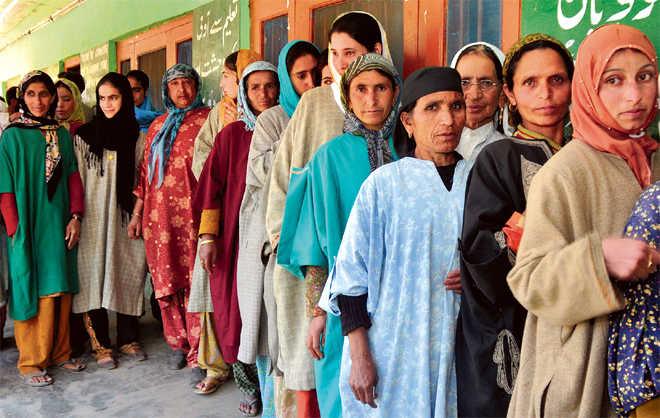
Each vote counts: A decent turnout will restore faith in the electoral process.
Lt Gen Syed Ata Hasnain (retd)
Chancellor, Central University of Kashmir
There is much discussion in the media about the panchayat and municipal elections in J&K, which were due in 2016, but have not been held because of the security situation. Panchayati Raj is a system in which gram panchayats are the basic units of administration. It has been established in most states by the Acts of the state legislature to build democracy at the grass-root level. The Balwant Rai Mehta Committee, set up in 1957, recommended the constitution of statutory elected local bodies with the necessary resources, power and authority devolved and a decentralised administrative system working under their control. However, it was Rajiv Gandhi’s push that resulted in the 73rd and 74th Constitution Amendments, although in 1992, a year after his assassination.
The 73rd Amendment gave body to Panchayati Raj while the 74th similarly gave constitutional status to the system of municipal governance, thus empowering the local bodies. In principle, these elections are fought on nonpolitical lines, but the entry of political parties into the system has come to be accepted. Due to constitutional provisions, the applicability of these Acts to J&K does not exist. There, the Panchayati Raj Act was passed in 1989 by the Assembly. Thus, while the system exists in the state, it is not under provisions of the 73rd and 74th Amendments. The first election in J&K under the Act of 1989 was held only in 2001, though it was not successful in all parts of the state due to the prevailing situation. The key provisions of the amendments have not been accepted in J&K and the system’s success has been only marginal due to lack of funds provided by the state government. Despite this, a second election was held in 2011, with almost 80 per cent turnout. However for separatists, the introduction of and any apparent success of the system is considered to be legitimisation of the state’s accession to India, and hence resisted even with the use of violence.
Since 2011, 16 members of panchayats have been killed and 30 injured. Terrorists had made the targeting of members of panchayats one of their main agenda in 2011-14, forcing many of them to publicly renounce their appointments from masjids. The participation of mainstream parties has been a feature in these elections. The provisions incorporated in the said J&K legislation do not cater to the other provisions related to the sectors in which empowerment is to be done.
This throws up interesting issues in the prevailing environment. When the electoral process for the Anantnag polls had to be placed on hold following violence (the same has yet to be notified), the conduct of the local bodies’ polls may appear strange. The postponed bypoll is the longest delay to fill any segment in the country, which may give a symbolic sense of success to anti-national elements. The local bodies’ elections would partially overcome that psychological disadvantage. The anti-national elements will want to prevent it. In 2011, when the polls were last conducted successfully, the state was emerging from the trauma of three years of street turbulence, but alienation was not as high as it is today. The creation of local bodies gave people the perception that self-governance would be more effective. That has not happened. In the light of this, and the unfortunate swing of events since, can a reasonable turnout be expected in the polls? It is probably a risk that the Centre is prepared to take. Success will permit the Governor to be bolder in his decisions. The poll outcome may not necessarily indicate the direction in which the political winds are blowing. Yet the results could also be perceived in different ways and pave the path for government formation through different political alignments.
The anti-national elements may justify a potential failure on their part to prevent a successful turnout by laying the blame at the altar of local, rather than larger state-level issues.
The spectre of Article 35A continues to hang over the polls. Though the SC has pended the hearing on petitions against the application of the Article till after the polls, the NC and the PDP have found an opportunity to display their reluctance to participate in the polls unless the Government of India and the state government (under Governor’s rule) clarify their positions with regard to the Article and take steps for its protection.
In their perception, non-participation in the polls will weaken the Centre’s ability to push for the abrogation of the Article. However, it will strengthen the cause of the separatists and may prevent any government formation, as even the breakaway elements from these parties may find it difficult to remain relevant and against the flow of the two parties.
The security situation may have marginally improved but fresh challenges emerge each day. The reported selective intimidation of terrorist families by the security forces followed by the kidnapping and release of 11 policemen’s relatives has created an awkward situation. South Kashmir continues to be restive and it cannot be ascertained whether the polls will help create more triggers for violence.
The polls are being held in phases, with the municipal bodies being elected during October 1-5 and the panchayats during November-December. The durbar will move from Srinagar to Jammu in the middle of these; not necessarily the best juncture for a political initiative. However, a bold risk may be the best solution as an ideal environment for the conduct of polls isn’t likely to present itself anytime in the near future. In all probability, the parties threatening boycott will fall in line, lest their political constituency is marginalised.
Local bodies’ elections, if successful, must follow up this time with their empowerment and conduct through alignment with some other states which have achieved great success, such as Rajasthan. But we must first get past the challenge of successfully holding the elections.



























